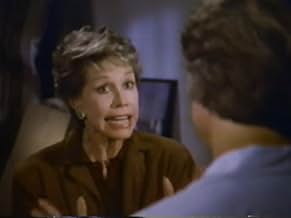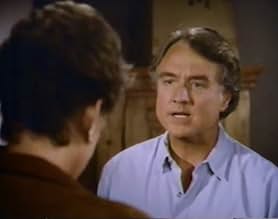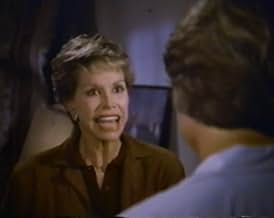Die frisch verheirateten Anne und Nick McGuire haben beide eine sehr persönliche Geschichte, die sie in die Ehe einbringen.Die frisch verheirateten Anne und Nick McGuire haben beide eine sehr persönliche Geschichte, die sie in die Ehe einbringen.Die frisch verheirateten Anne und Nick McGuire haben beide eine sehr persönliche Geschichte, die sie in die Ehe einbringen.
Folgen durchsuchen
Fotos
Handlung
WUSSTEST DU SCHON:
- WissenswertesThe casting of John Randolph as the right-wing father-in-law "Red" McGuire was an inside joke. Randolph was one of the Hollywood actors who had been blacklisted for many years for his prior membership with the Communist Party.
Ausgewählte Rezension
What if "The Brady Bunch" had a few less kids, father Mike was a staunch Conservative, and mom Carol was a complete liberal, while Carol worked in New York Government?
It might look a little bit like this...
After "Mary Tyler Moore" ended, the star of that program had a difficult time finding a new groove. She had something of a charmed TV Life to that point, being part of the cast of "The Dick Van Dyke Show" and her own Minneapolis series, with both shows becoming beloved favorites while they originally aired, and later, still quite popular in syndicated reruns.
Getting that new successful series for Mary wasn't for lack of trying. Comedy, Variety, there were several attempts to give Mary a reboot and in this try, we had a kind of dramedy thing going on.
I have to think part of the influence of this series was another surprise hit on NBC, which began the summer before this series started: "The Days and Nights of Molly Dodd," which is also on this list of The 400 Most Notable TV Series Set in New York CIty. The elements that link "Molly" to "Annie" are the fact that it was a single camera shoot, with no audience or laugh track, and the material wasn't your standard sitcom jokes. This was attempting to be life, but just a little bit edgier, and maybe (hopefully) funnier.
Mary is, of course, the titular character, working as Deputy Coordinator of Community Relations in lower Manhattan, with one kid from her previous marriage. She commutes from her home in Bayonne, New Jersey, "Working Girl" style, on the ferry. She's a liberal who, as the series begins, is a newlywed with Nick McGuire, played by Dennis Arndt, Dad to two, and who is a construction contractor and gets his politics from his dad, a very conservative restaurant owner.
Even in her most recent series at this point, "Mary," which had her as a writer for a Chicago based publication with a whole series of quirky co-workers, Ms. Moore had a live audience, so you got to hear reactions to the jokes. It's a little jarring to see this "real life" attempt without that reaction. I don't think that was the worst of it, but it was nothing like anything Ms. Moore had done, to this point.
Also, the program did use that political angle, with the Conservative Republicans squaring off against the Liberal Democrats in a power struggle that we now know all too well.
New York played a part because city government, the welfare of the citizens, the demands of the office Annie held and her continual commutes from and to Jersey were all a part of the situation, and Nick's construction projects even start to interfere with Annie's work, as his job deals with New York City properties as well.
The mentality of network programmers is what likely killed this show fairly quickly. You have a well known star, doing what she does in a format that's a little bit different. Do you find a suitable time slot so that people can find the program, develop a liking for it and make it a hit? Or do you throw it against one of the hottest shows currently on the air and hope that it destroys the ratings of that program? The thinking was to place this show opposite ABC's "Full House," which was an already well established and popular family comedy.
Also, CBS apparently wanted to create a comedy block with Dick Van Dyke's series, "The Van Dyke Show," a standard style sitcom which featured father and son, Dick and Barry Van Dyke together. That program also was having problems finding an audience, and pairing it with Mary and this dramedy format, back to back only made sense in one way: The execs must have hoped fans of the Petrie family would tune in to see them once again, here.
"Annie McGuire," with its darker toned comedy, the political undercurrents and desire to make statements about humanity, plus the lack of a studio audience or laugh track to sweeten the jokes just didn't get anywhere, despite some concepts worth exploring and some plots that had something to say.
It might look a little bit like this...
After "Mary Tyler Moore" ended, the star of that program had a difficult time finding a new groove. She had something of a charmed TV Life to that point, being part of the cast of "The Dick Van Dyke Show" and her own Minneapolis series, with both shows becoming beloved favorites while they originally aired, and later, still quite popular in syndicated reruns.
Getting that new successful series for Mary wasn't for lack of trying. Comedy, Variety, there were several attempts to give Mary a reboot and in this try, we had a kind of dramedy thing going on.
I have to think part of the influence of this series was another surprise hit on NBC, which began the summer before this series started: "The Days and Nights of Molly Dodd," which is also on this list of The 400 Most Notable TV Series Set in New York CIty. The elements that link "Molly" to "Annie" are the fact that it was a single camera shoot, with no audience or laugh track, and the material wasn't your standard sitcom jokes. This was attempting to be life, but just a little bit edgier, and maybe (hopefully) funnier.
Mary is, of course, the titular character, working as Deputy Coordinator of Community Relations in lower Manhattan, with one kid from her previous marriage. She commutes from her home in Bayonne, New Jersey, "Working Girl" style, on the ferry. She's a liberal who, as the series begins, is a newlywed with Nick McGuire, played by Dennis Arndt, Dad to two, and who is a construction contractor and gets his politics from his dad, a very conservative restaurant owner.
Even in her most recent series at this point, "Mary," which had her as a writer for a Chicago based publication with a whole series of quirky co-workers, Ms. Moore had a live audience, so you got to hear reactions to the jokes. It's a little jarring to see this "real life" attempt without that reaction. I don't think that was the worst of it, but it was nothing like anything Ms. Moore had done, to this point.
Also, the program did use that political angle, with the Conservative Republicans squaring off against the Liberal Democrats in a power struggle that we now know all too well.
New York played a part because city government, the welfare of the citizens, the demands of the office Annie held and her continual commutes from and to Jersey were all a part of the situation, and Nick's construction projects even start to interfere with Annie's work, as his job deals with New York City properties as well.
The mentality of network programmers is what likely killed this show fairly quickly. You have a well known star, doing what she does in a format that's a little bit different. Do you find a suitable time slot so that people can find the program, develop a liking for it and make it a hit? Or do you throw it against one of the hottest shows currently on the air and hope that it destroys the ratings of that program? The thinking was to place this show opposite ABC's "Full House," which was an already well established and popular family comedy.
Also, CBS apparently wanted to create a comedy block with Dick Van Dyke's series, "The Van Dyke Show," a standard style sitcom which featured father and son, Dick and Barry Van Dyke together. That program also was having problems finding an audience, and pairing it with Mary and this dramedy format, back to back only made sense in one way: The execs must have hoped fans of the Petrie family would tune in to see them once again, here.
"Annie McGuire," with its darker toned comedy, the political undercurrents and desire to make statements about humanity, plus the lack of a studio audience or laugh track to sweeten the jokes just didn't get anywhere, despite some concepts worth exploring and some plots that had something to say.
Top-Auswahl
Melde dich zum Bewerten an und greife auf die Watchlist für personalisierte Empfehlungen zu.
Details
Zu dieser Seite beitragen
Bearbeitung vorschlagen oder fehlenden Inhalt hinzufügen















